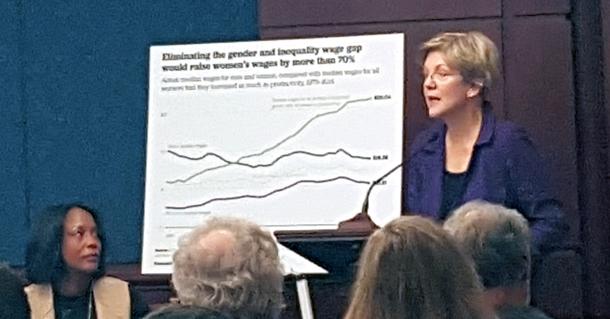
Did you know that the wage gap between men and women workers has been narrowing for the past three decades? Great, right? Well it’s not for the reason you might think. It turns out that women’s wages have been stagnant since the 1970s, while men’s wages have been falling!
Dr. Elise Gould of the Economic Policy Institute joined members of Congress and labor leaders on Wednesday to call for progress that goes beyond closing the wage gap. “Gender wage parity will not improve women’s economic prospects if men’s and women’s wages are equal but both are stagnant,” she told a crowd at the U.S. Capitol. Instead, the EPI is proposing a 12-point Women’s Economic Agenda that addresses the many different pressures that women face in today’s economy.
Among the priorities is better access to child care and paid leave for personal or family illness. Women still bear the brunt of child care duties in the United States, but only 12 percent of private-sector employees can take paid time off to care for a family member. And few can afford regular child care. While the costs of child care are skyrocketing – it’s more expensive than rent in most parts of the country – the largely female workforce that provides this service is still struggling to get by.
Child care provider Janell Lankford told the crowd that she is barely getting by even though she works about 70 hours each week. But she strongly believes in the value of her work. “I have a passion,” she said. “I’m not going to walk away from somebody else’s children – they still need to be taught and they still need to be loved.”
Lankford is part of the Fight for 15, which is working to secure a $15 hourly wage and union rights for child care providers. The right to form a union is another important part of the Women’s Economic Agenda. Women in unions are much more likely than their nonunion counterparts to earn a living wage and benefits.
Massachusetts Sen. Elizabeth Warren heartily endorsed the economic agenda. She says that she owes her own success in life to the economic policies of postwar America, in which union rights were strong and the minimum wage was high enough that her mother was able to support a family with an entry-level job at Sears.
"I always get applause when I say I'm for equal pay for equal work," she said. "But real economic equality will take more changes in America's economic policies.”